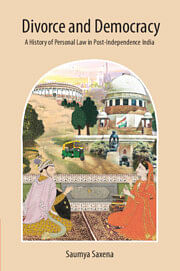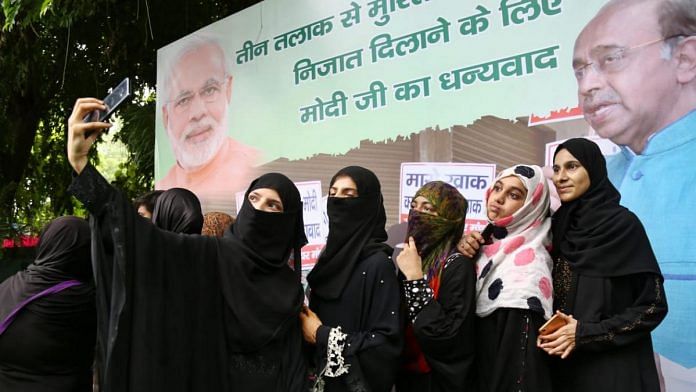When women frame their battles through the law, they are confronted with two obvious challenges. First, their experiences of violence and violation have to be made legible to the law or the adjudicator. Second, a courtroom or even an alternative forum requires parties to occupy a binary—the violator and the violated, the culprit and the victim. This means that parties may find themselves clubbed with co-petitioners who they strongly oppose ideologically, so long as the end goal, ‘the prayer’, is for a similar end. Opposition to any aspect of Muslim personal law by Muslim women’s movements, organizations, or individual women remains vulnerable to appropriation by the Hindu nationalist political establishment. This put women’s demands in a precarious paradox of simultaneously opposing Hindu nationalism and also bargaining with them.
On the other hand, any argument to protect minority practices found ‘legal’ endorsement before a court by organizations such as the AIMPLB, and, therefore, the feminist stance on the protection of minorities shared an uncomfortable space with the orthodox clergy. To recover the particularity of Muslim women’s articulations, focussing our analysis on the means of resistance and the strategy preceding the law—judgment or bill—becomes crucial.
The founding members of the two Muslim women’s organizations that had joined Shayara Bano’s petition in court against the practice of triple talaq, the Bebaak Collective and the BMMA, expressed disappointment with the lack of support by feminist organizations that identified as secular. They also expressed their disappointment over their co-petitioners—Ishrat Jahan and Shayara Bano’s direct or tenuous association with the BJP, as Jahan later joined the BJP and Bano was also offered a position in the party in Uttarakhand. Moreover, they suggested that this co-option into the BJP might be a consequence of the inability of secular feminist mobilization to accommodate Muslim women’s demand for legal remedies in family law. The strategies of the Bebaak Collective and the BMMA differed substantially.
Also read: Delhi goes on a book date with divorce and democracy, but Nehru steals the show
Hasina Khan of the Bebaak Collective self-identified as secular; she stated that the objective of the collective was to take ‘the voice of women from the street to Parliament’ (auroton ki awaaz sadak se sansad tak).15 The BMMA, on the other hand, also identified as a secular women’s organization, but with a focus on Muslim women and placed significant emphasis on routing their activism through provisions within Islamic religious texts. The two organizations disagreed particularly on the Muslim Women’s Protection of Marriages Act, 2019 (discussed in the next sub-section), which criminalized the pronouncement of triple talaq. While the Bebaak Collective opposed it, the BMMA supported it with some reservations.
For the BMMA, rights were sourced from the Quran as their haq (right) but in enabling women to access these rights, they did not foreclose the use of legal strategies. In 2016, the Bebaak Collective was born out of a convention of many women’s organizations. Hasina Khan who formerly worked with Awaaz-e-Niswaan (until 2013) became one of the leading voices of the collective. In a personal interview, she said that she found the framework of religion very restrictive. She contended that while she was well acquainted with the rights granted to women under the Quran, she also believed that book could be questioned: ‘What if one is an atheist-Muslim? … someone who culturally identifies as a Muslim but is not religious.’ She regretted that the women’s movement has been divided on the issue of legal intervention and framed it as a betrayal for Muslim women: ‘Shayara Bano was not the first woman I met who had suffered the fate that she did. We had worked with many women who had suffered triple talaq and we had tried a lot to convince these women to file a case in court.’ She argued that the realities and issues of each minority are very different.
Has she ever [named an activist] ever gone to the Jama Masjid and tried discussing why women have to wear burqa? The way Christian women are able to talk about homosexuality, or Hindu women on temple entry? Why do we hesitate in talking about Muslim women’s sexuality-we only talk about Muslim women’s ‘rights’ why is only roti, kapda, makaan [food, clothing, shelter] important for Muslim women. Why do groups say Muslim women community is not ready? Sometimes its 1992 [demolition of the Babri mosque], or 2002 [Gujarat riots] will there ever be a good time to talk about Muslim women? Why do they want to prepare us to survive and suffer [rehne, pisne] within the community, have our own mosques, own schools, are we not citizens?
Khan highlighted that specific causes can occasionally become collateral damage in larger battles to oppose Hindu nationalism. It poses a critical question: Should Muslim women have to forsake any conversation on legal remedies until the general problem of Islamophobia and Muslim marginalization by the state and the public is addressed? And further, can a conversation with the state on reform of Muslim personal law really be of consequence when Islamophobia characterizes almost all contemporary state interventions? Muslim conservatives and secular intelligentsia shared their opposition to Hindu nationalism and consequently to legislative intervention in Muslim personal law. Not only did this reproduce the privatization of personal law, but not separating the law from its makers undermined the dialogue that the law had the potential to generate.
Also read: India’s liberals must decide: Oppose UCC because of BJP or uphold secular principles?
Yet despite the disagreement between the BMMA and Bebaak’s leadership on religion as a source of rights, in the triple talaq case, the petitions of both organizations were clubbed together (along with the prayer of the government). These parties ultimately desired state intervention in matters of Muslim family law, and more specifically an end to instant, unilateral divorce. After the Supreme Court verdict on triple talaq, the BMMA expressed its intentions of filing fresh petitions against practices of bigamy and nikah halala as well, which were issues that had been expressly omitted from consideration by the court in the hearing on triple talaq. A number of petitions were subsequently filed by Muslim women as well as BJP members against the practices of nikah halala and bigamy, which remain pending before court. The BMMA is yet to file its own.
The women’s movement became particularly divided on the question of bigamy. Scholar and activist Flavia Agnes argued that a ban on polygamy may deprive Muslim second wives of their existing rights and reducing their status of a ‘mistress’ or ‘keeps’, terms that the Supreme Court frequently used to describe second wives, which would never be attributed to women under Muslim law. While the idea of bigamy pushed the conversation towards new imaginations of a family, in most cases in India, women had no agency in declining a bigamous arrangement, and contracting a second marriage was also an exclusive right for men. This argument created an odd-line position whereby citing the failure of the bigamy prevention law among other communities and the plight of second wives among Hindus, bigamy could be defended as a ‘protection’ for Muslim women.
A comparative picture of statutory interventions in Hindu and Christian personal law reiterates the claim that Muslim personal law was chiefly debated in courts than in parliament, as Chapter 5 demonstrated.
 This excerpt from Saumya Saxena’s ‘Divorce and Democracy: A History of Personal Law in Post-Independence India’ has been published with permission from Cambridge University Press.
This excerpt from Saumya Saxena’s ‘Divorce and Democracy: A History of Personal Law in Post-Independence India’ has been published with permission from Cambridge University Press.



